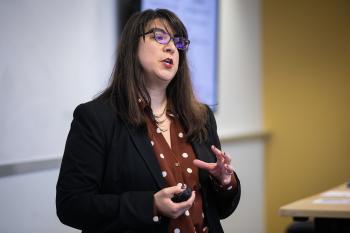Oct 24
2019
ASU Student Uses Accelerator To Launch Healthcare Program To Supports At-Risk Individuals
By Ramona Ramadas, Arizona State University graduate student — utilizing the resources provided by the HEALab, she launched New Trails Navigators.

Over the past decade, technology and its applications continue to impact and advance our everyday lives, from things like smartwatch wearables that track our daily activity and wake us up in the morning to 3-D printing of medical models and virtual reality innovations that have the capacity to accurately replicate an automated surgery environment.
Similarly, ASU Online has brought new technology and resources to students like myself pursuing health and health care-related degrees to encourage innovative approaches to coursework and career paths. One of the most impactful resources I’ve seen available to the student community is the Health Entrepreneurship Accelerator Lab (HEALab).
The accelerator, which provides networking, idea-generation support, pitch competitions and proposal prep assistance launched in September 2017 as a health innovation entrepreneurship lab for Arizona State University (ASU) students, faculty – both online and on campus, and the community to cultivate disruptive healthcare solutions. It is a collaborative effort with academic units and the Office of Entrepreneurship and Innovation with the goal of educating health-focused leaders to navigate the accelerating disruptions in healthcare and create new solutions to real-world problems.
As a recent Master of Healthcare Innovation (MHI) graduate, I have been able to leverage HEALab to kick start my peer health program, New Trails Navigators. The award-winning care transformation program I’ve created focuses on serving individuals who struggle to get the personalized care they need due to homelessness, incarceration, addiction or lack of insurance. The program connects at-risk individuals with peer health navigators who are uniquely qualified to re-direct them toward sustainable health and wellness.
The peer health navigators can relate in a way that other support service representatives can’t because they have been in an at-risk situation, themselves. This relatability allows the navigators to connect, build trust and positively impact the individual’s situation. Today, the program is supported by a learning management system that delivers our whole-person peer training. This training is unlike any other peer support program in place today, as an app-based platform allows peers and patients to interact in a variety of ways, ensuring that the patient is supported where they live, work, and play. Over time, artificial intelligence will become a part of the program delivery.
My educational journey began with an innovative idea to use my passion to help others in need. HEALab was just one of several resources provided by ASU Online that led to New Trails Navigators becoming a reality. While enrolled in the master’s level Healthcare Innovation degree program, I was granted the tools and supportive community needed to progress the New Trails concept. Once paired with ASU faculty and mentors, I was able to pull from a wealth of industry knowledge, guidance, and community to build the connections necessary to get New Trails Navigators off the ground, a feat HEALab helped take to the next level.
I also leveraged the internal ASU program, Venture Devils, to assist in my entrepreneurial journey. While the MHI program carved out a stable foundation to build the New Trails Navigators on, ASU’s Venture Devils helped give the program legs.
Despite living and working in Washington state, I’ve been able to work with multiple ASU professors and won more than $60,000 in funding to help bring the healthcare startup to life through pitch competitions provided by HEALab and ASU connections.
Today, I work as a healthcare consultant and am continuing to build New Trails Navigators to its fullest potential. I am currently working with communities in Washington and Arizona on a pilot program to bring New Trails Navigators to a national level and help at-risk individuals across the country. What began as an idea has progressed exponentially while pursuing my degree; I credit the MHI program, mentorship, and my entrepreneurial spirit to the recognition, support and funding New Trails Navigators has received.
My relationship with ASU continues to grow in ways that are exciting and inspiring to me. In the Spring 2020 term, I’ll be launching ASU’s first online healthcare entrepreneurship course. Watching an idea transform to a funded program and build meaningful relationships with ASU along the way helped us all see that there is an opportunity and a need to do this for more innovators around the country. This is an exciting opportunity to support ASU’s vision of growth.
To learn more about New Trails Navigators and how to get involved, visit newtrailsnavigators.org. If you’d like to learn more about how Arizona State University is supporting health care innovation, visit entrepreneurship.asu.edu/entrepreneurship-innovation-healab.